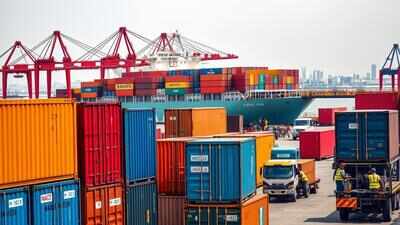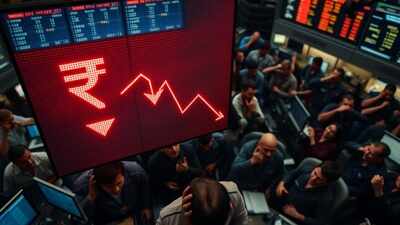Low costs, tech focused & more: How can Indian exports stay competitive? Explained

 At a time like this, India needs to evaluate its export strategies, with focus on long-term competitiveness through technology, cost efficiency, and domestic production, Ajay Srivastava, founder of the Global Trade Research Initiative (GTRI) explainedSpeaking to ANI, Srivastava said, “The focus should be on lowering production costs, simplifying regulations, and accelerating ease of doing business especially in logistics, compliance, and taxation.” He also highlighted the need for a dual approach, which combines foreign technology partnerships with investment in reverse engineering and product localisation.Referring to the electronics, machinery and digital technology sector, the GTRI chief said, “What India consumes, it must also be able to make and export.” Meanwhile, on the international trade front, negotiations with the US are advancing well, even though no official announcement has been made.India is also quietly reviewing sectoral risks and preparing to mitigate potential disruptions by diversifying trade away from the US and boosting domestic capabilities.Regarding Europe, Srivastava confirmed that the India-UK free trade agreement has been signed and is pending ratification in the British Parliament.
At a time like this, India needs to evaluate its export strategies, with focus on long-term competitiveness through technology, cost efficiency, and domestic production, Ajay Srivastava, founder of the Global Trade Research Initiative (GTRI) explainedSpeaking to ANI, Srivastava said, “The focus should be on lowering production costs, simplifying regulations, and accelerating ease of doing business especially in logistics, compliance, and taxation.” He also highlighted the need for a dual approach, which combines foreign technology partnerships with investment in reverse engineering and product localisation.Referring to the electronics, machinery and digital technology sector, the GTRI chief said, “What India consumes, it must also be able to make and export.” Meanwhile, on the international trade front, negotiations with the US are advancing well, even though no official announcement has been made.India is also quietly reviewing sectoral risks and preparing to mitigate potential disruptions by diversifying trade away from the US and boosting domestic capabilities.Regarding Europe, Srivastava confirmed that the India-UK free trade agreement has been signed and is pending ratification in the British Parliament.
“(The EU deal) is in an advanced stage of negotiation, with most chapters close to closure,” he said, adding that both agreements are expected to open new markets, strengthen investor confidence, and integrate supply chains with Europe.Global financial trends are another key factor for India.
“When the Fed raises rates, money tends to flow back to the US, putting pressure on the rupee, widening the current account deficit, and tightening liquidity,” Srivastava warned.
He stressed that careful macroeconomic management and strong domestic growth drivers will be critical to managing currency volatility while sustaining exports.On the question of India staying out of trade blocs like RCEP and CPTPP, Srivastava said the country is not at a disadvantage.
“Nearly 80% of global trade still takes place at non-preferential tariff rates.
Rather than rushing to join every bloc, India should focus on improving export competitiveness, logistics efficiency, and ease of doing business.”“India, rather than waiting for global stability, should use this ‘no-rules’ phase to rebuild the foundations of competitiveness across industry, agriculture, and services,” he said.
Investments in green and digital technologies, large-scale manufacturing, and secure supply chains are key, he added.On addressing the trade deficit with China, he said India needs “large-scale reverse engineering, technology adaptation, and supply chain localisation” in sectors like electronics, machinery, and chemicals.
“Over time, such capability-building will not only narrow the trade gap but also make India a credible global supplier,” he said.He concluded by urging coordinated action from both government and industry.
“The government must provide a stable trade policy, faster clearances, and targeted incentives,” he said.
“The private sector, in turn, should invest in R&D, design, branding, and technology partnerships to create globally competitive products.”“In a slower, more fragmented global economy, the winners will be those who build resilience at home while shaping trade on their own terms,” Srivastava said.



